How to create a classic living room interior?
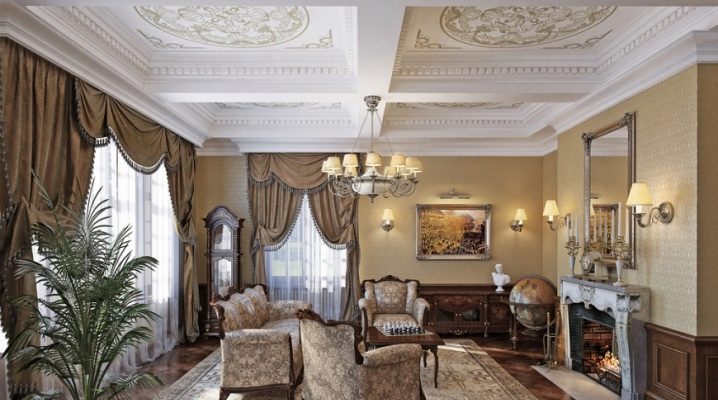
The living room is the heart of any home. This room is special, it is a resting place for households, a central area for receiving guests, a festive area during celebrations. Modern interior design has many directions for decorating a living room, but the classic remains the best of them: it is this style that attracts special attention with its solemnity.
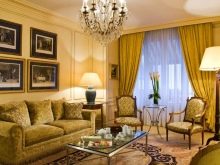
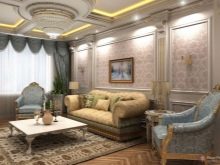
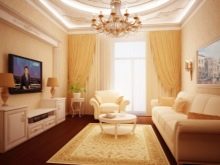
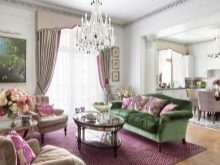
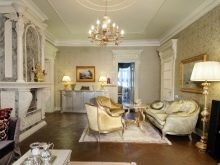
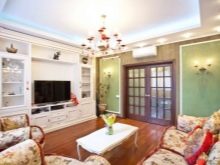
Peculiarities
The classic style, which originated in the 18th century, exists outside of fashion: whatever the latest trends, it will always be popular and will find its fans. At one time replacing the baroque and rococo, it was distinguished by rationalism, while it had all the elements of antiquity and sophistication, which were harmoniously emphasized by a minimal set of design elements. The interior decoration of the living room in a classic style is a sign of good taste, speaks of the intelligence of the owners of the house. This direction competes with vintage and modern style, while its main principle is moderation. He does not scream, does not catch the eye, does not irritate with aggressive colors: everything obeys the harmony and natural tones of the color palette, so the classics are suitable for established people of different ages.
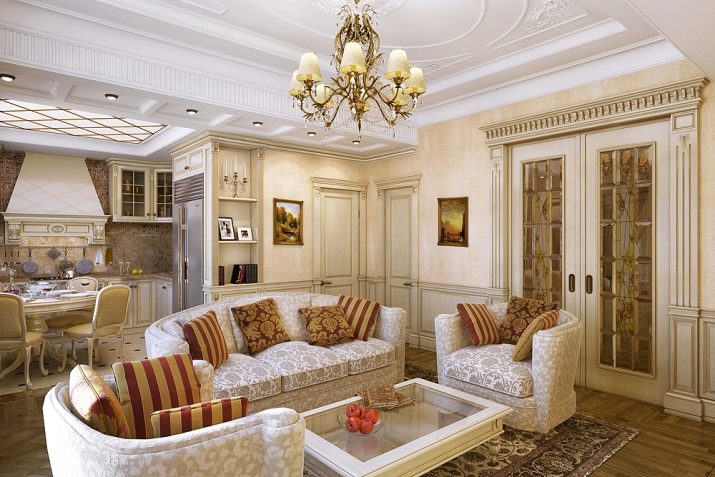
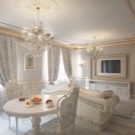
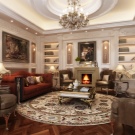
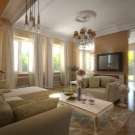
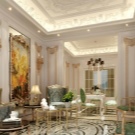
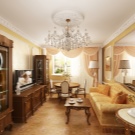
Characteristic features of the style
Being a kind of demonstration of financial well-being and a calm attitude to life, the classic style is not devoid of the principles of drawing up an interior composition:
- the living room should have a high ceiling (about 3 m), which allows you to decorate the space with a volumetric central lamp and plaster stucco;
- the area of such rooms should be sufficient to feel the spaciousness;
- each element of stylistics obeys the rule of symmetry (proportions of the "golden section"), strict geometry and laconic forms, with a luxurious appearance it is devoid of pretentiousness;
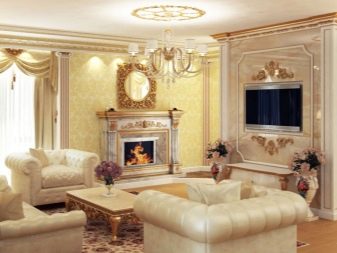
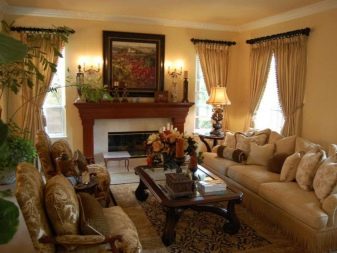
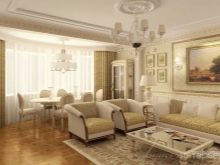
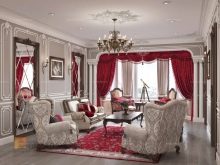
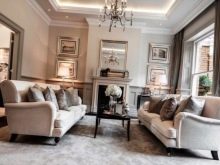
- style welcomes the combination of different materials in decoration and decor, while it is important that they are expensive;
- elements of English classics are welcomed in the design (for example, fireplace and guest areas);
- light notes of monumentality and palace style can glimmer among the decoration in the interior;
- in the interior of the room, a design of the space in the spirit of a boudoir is allowed, while the design may contain elements of a baroque room.
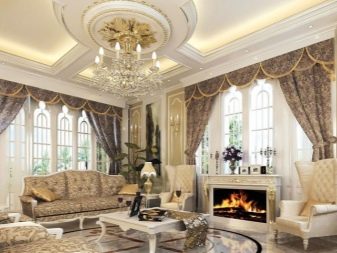
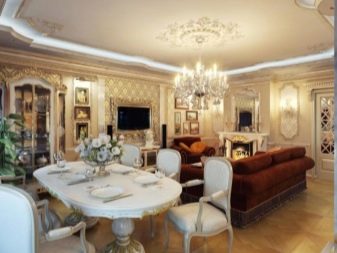
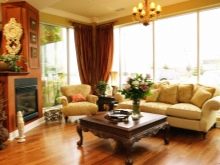

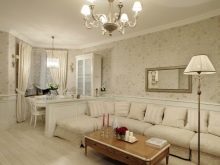
The interior of the living room in a classic style is adored by conservatives, often choosing the narrow focus of the variety of this style. It cannot be called eclectic: all the elements are selected thoroughly, choosing either a modest or a premium type of interior, and if it is important for some to show well-being, others choose interior items in such a way that, without unnecessary pathos, indicate a high social level. It is undesirable to equip a small space in this style: it runs the risk of looking like a heavily cluttered room.
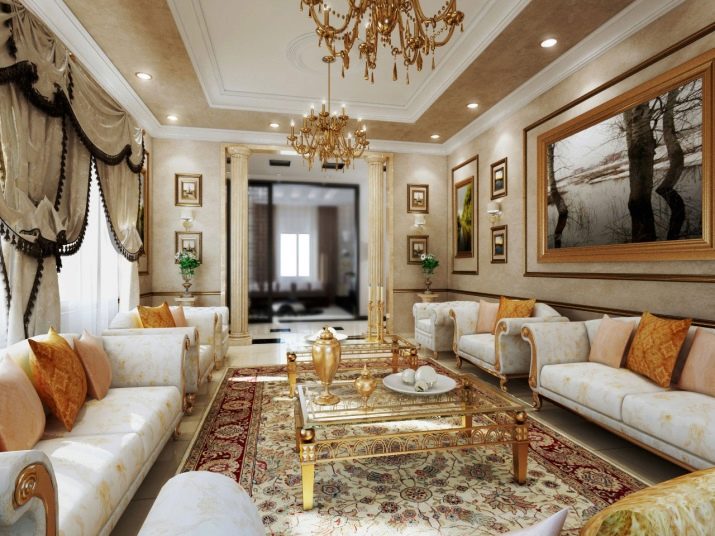
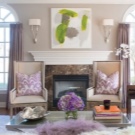
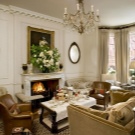
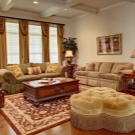
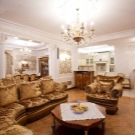
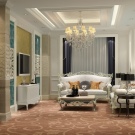
Color combinations
The color palette of the classic interior adheres to predominantly delicate and pastel shades. These are soft beige, cream, olive, bleached sunny, golden, pale blue and light green tones. Often, the living room is decorated in combination with muted shades of brown, using bronze, copper and wood paints as contrasting tones.The favorite of classic tones is white: it always brings space, light into the space and gives the room depth, relieving it of its limitations if there are dark tones in it.
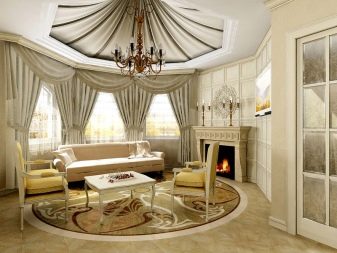
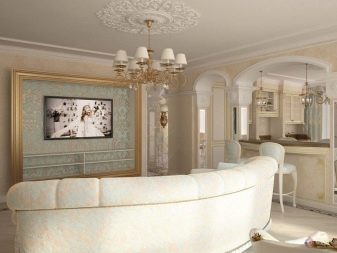
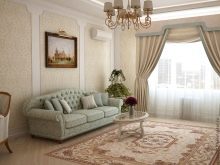
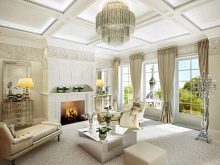
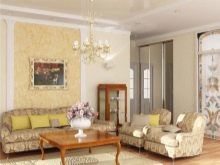
The actual combinations of shades of the color palette of the classic style of the living room today are combinations:
- white, light brown, gray and smoky blue;
- golden yellow with white, brown and pinkish gray;
- white with brown and black;
- cream with gold, light wenge and wine;
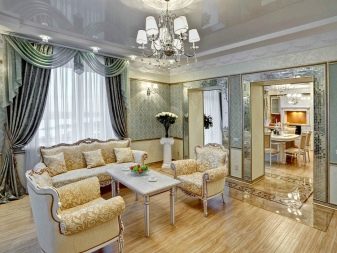
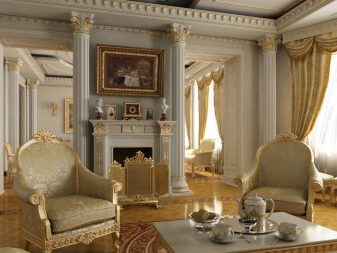
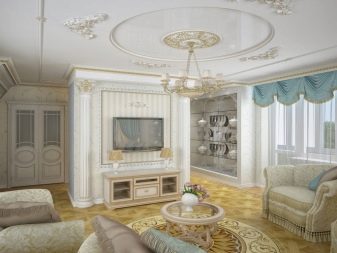
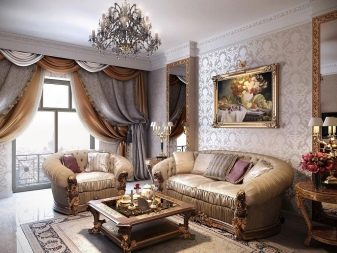
- beige with red-brown, chocolate and white;
- olive, white with light wenge and gold;
- beige, white and brown;
- light gray, white, amber and gold.
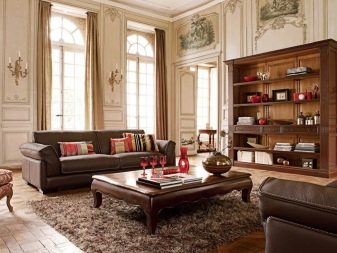
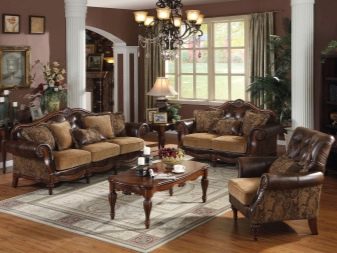
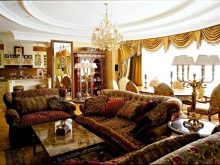

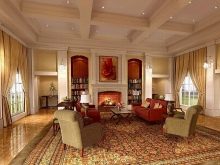
The light tones of the style are often emphasized by dark strokes, the number of which is limited: the classics do not accept gloom and darkness.
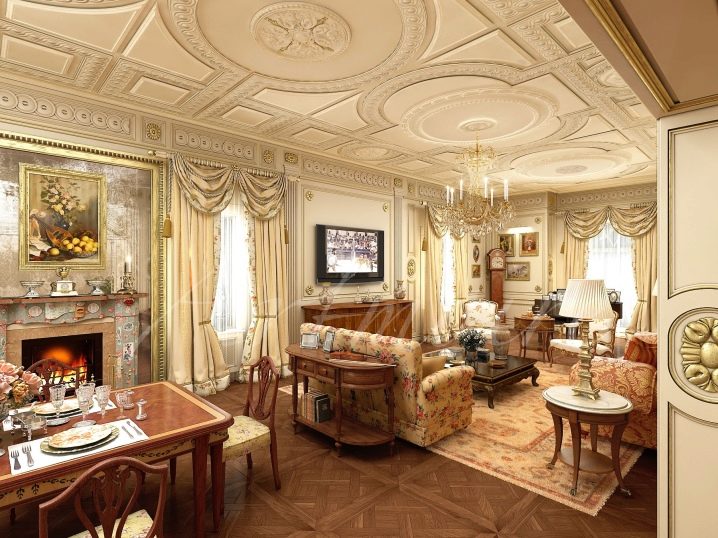
Decorating the walls of the classic style allows the use of premium quality wallpapers in the finishing of vertical surfaces and their combination with modern expensive finishing materials. Budget paper wallpapers are unacceptable here: only embossing, silk-screen printing, ecological non-woven, textile and liquid wallpapers can sufficiently convey the desired atmosphere.
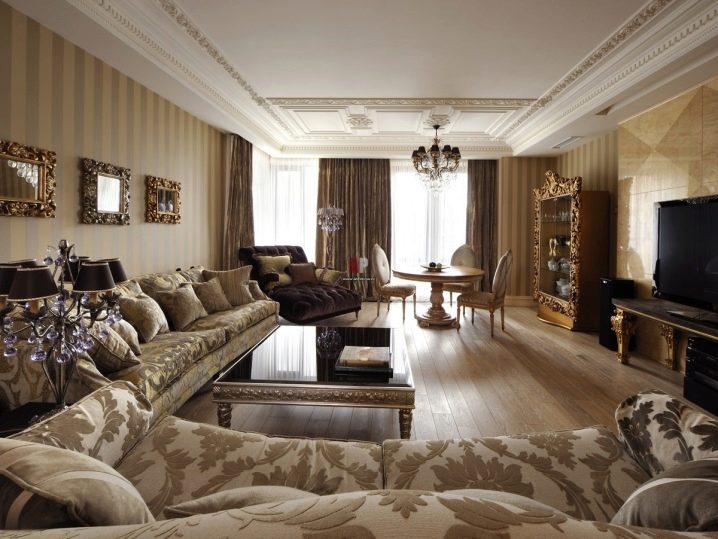
Sharp prints cannot be used in wall decoration: English stiffness is welcomed, drawings should not be conspicuous. Ideally, if the color is conveyed through the texture of the wallpaper, or by embossing, in which the pattern does not stand out outwardly, having a shade two tones darker than the main background. It shimmers in the light, which looks stylish and expensive. No abstract and ethnic motives: more often they are golden monograms that do not flash with the brightness of contrasts, as well as light plant motives.
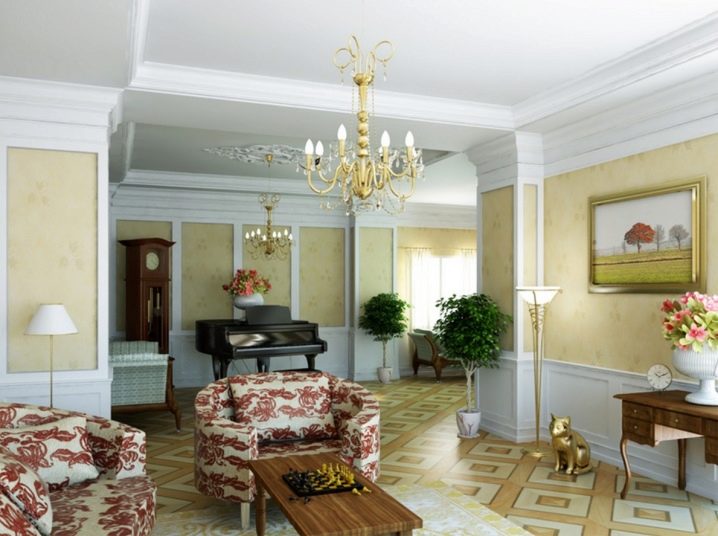
Materials (edit)
The materials used in the decoration of the stylistics must correspond to the required level of furniture and lighting, as well as wall decoration. If it is furniture, in the first place is genuine leather or tapestry, velvet, silk, satin.
Curtain textiles should be expensive, combined with delicate tulle. Long-pile carpets made of natural wool and cotton fibers are the priority. Less often, carpets can be made of mixed raw materials with the addition of high-quality synthetics, which improve their performance properties. When choosing textiles for decorative pillows or a soft blanket, in the first case, you should give preference to silk and jacquard materials, in the second - woolen and cotton.
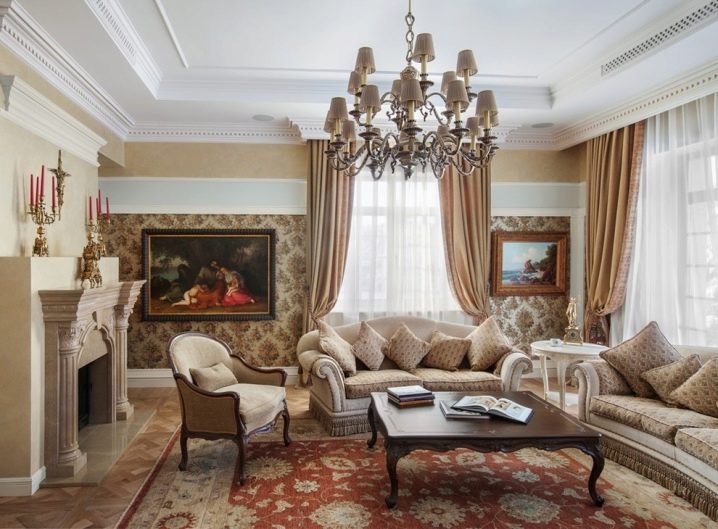
Lighting
The classic style implies massive central lighting and corresponding additional lighting. The best ceiling lights are pendant chandeliers. They can be made in one or several levels, have a lot of light sources, each of which is covered with an identical decor in the form of small floor lamps, like table lamps, candles or other shades. The hallmark of classic-style lighting devices is the use of crystal, glass and forging elements for bronze in the decor of lamps.
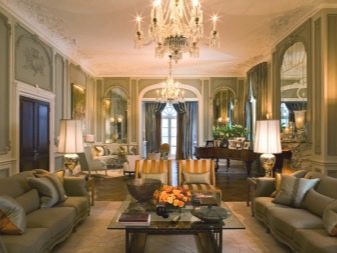
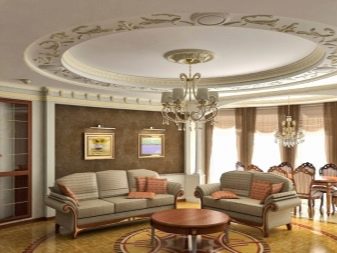
A distinctive feature of this style of lighting is the abundance of light: the living room should be bright, as close to natural daylight as possible. However, the design can also imply a kind of "theatrical" lighting, in which the luminous flux is gently diffused around the entire perimeter of the room. An original approach to lighting is the use of modern stylistic techniques in lighting decor, when, in addition to sconces with candle decor, LED spotlights are added to the forged pendant ceiling lamp, accentuating individual functional areas of the space.
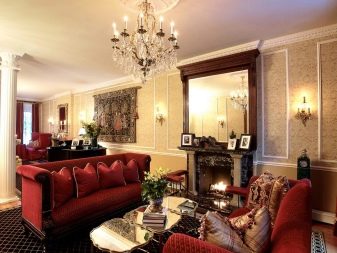
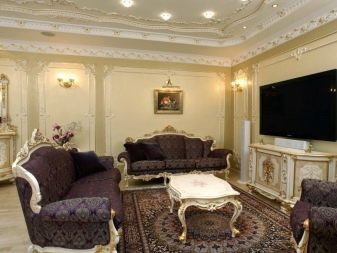
Situation
Performing the interior composition of the living room, it is important to properly organize the space. Each item takes the right place, taking into account the available usable space. The pieces of furniture inherent in this style are massive and expensive.Wood-fiber materials are unacceptable: cabinet furniture is made exclusively from wood of the best species. At the same time, the space includes a whole ensemble of furniture, among the elements of which the key details of the hall's furnishings are a sofa and armchairs, as well as a coffee table and a wardrobe. If you draw a visual line, dividing the space into two parts, the situation in it will often be mirrored.
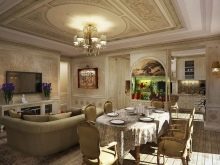
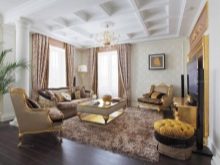
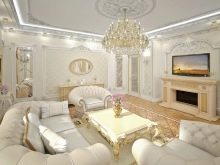
Furniture should not be small, while it is freely placed in the roomwithout interfering with the freedom of movement of household members. Ideal if it has decorative elements decorated with gilding or bronze paint. Cheap and colorful upholstery is unacceptable: all the details of the furnishings indicate a special status. Instead of a coffee table, a convex cabinet can be located in the room, the sofa can be linear (straight) or angular, necessarily large, setting up a relaxing atmosphere. A large chest of drawers with a glass facade or an antique bureau, as well as a piano, looks good in the interior of the living room.
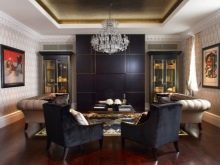
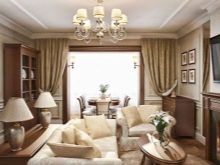
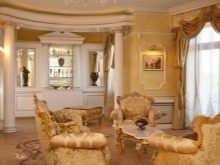
The raw materials used for furnishing must be natural and harmless. Not all modern materials fit the understanding of the classic style: for example, cheap alloys and plastic, harmful substances released into the air, are not a method of arranging a space in a classic style. Glass, on the contrary, effectively fits into the setting, if it is, for example, a coffee table top or a cabinet front.
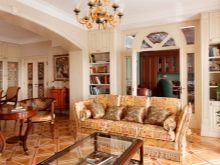
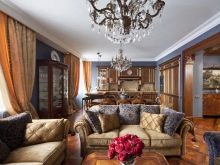
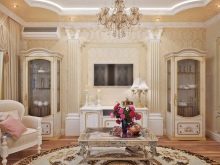
Directions of the classics
The classic style has absorbed several stylistic trends. The most striking of them are classicism and neoclassicism. The spirit of residences is inherent in classicism. The style, which appeared in France, is based on the standards of ancient architecture, while strict geometry, symmetry and balance of the interior composition are visible in it. The materials used in this style are expensive: these are necessarily rare stones, valuable tree species, satin, velvet and silk fabrics. The walls of the style are decorated with decorative plaster, thin textile or eco-friendly non-woven wallpaper. Shaped furniture, accessories with crystal and glass finishes from expensive glass are held in high esteem.
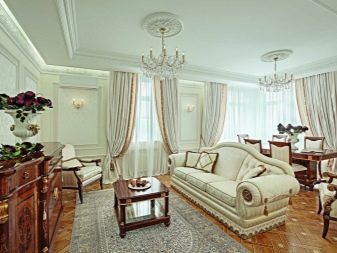
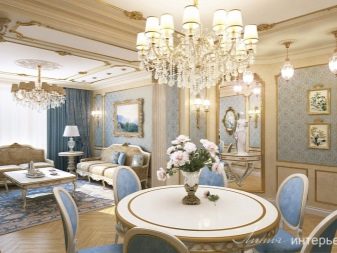
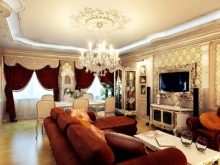
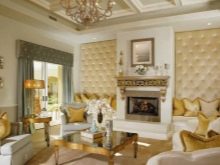
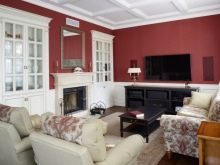
Neoclassical interior is close to modern trends stylistics with its characteristic Italian attitude to decor: style + chic + lack of unnecessary things. He does not reject the innovations of progress, while the design often contains curtains with lambrequins, stucco moldings, borders, doorways with pilasters and mirrors. Neoclassicism is a kind of interpretation of classical traditions in a new way: in everything one can feel aristocracy and nobility, symmetry and orderliness. In the decoration of the walls, decorative panels, plaster and wallpaper are used, the colors of which are more varied and allow the presence of discreet floral and plant patterns on the canvases. The latest materials are appropriate here, ceramic tiles, parquet, high-class laminate, as well as self-leveling floor look good.
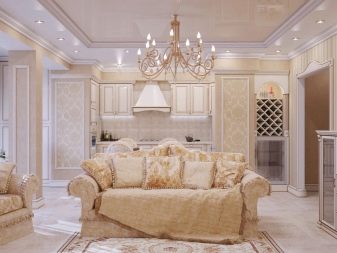
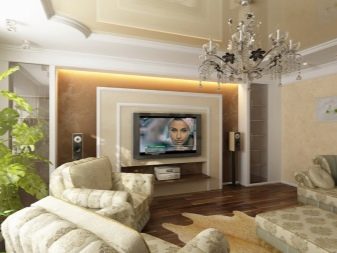
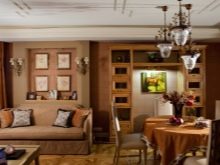
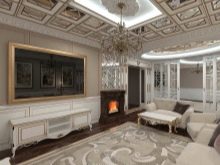
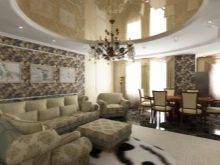
Fresh ideas and fashion trends
The fashionable trend of our time is the zoning of space. The living room can be divided into separate functional areas, highlighting, for example, a fireplace area or a guest space. This is done by combining wallpaper, lighting, combining in wall decoration materials of different composition (for example, delimiting vertical planes with wallpaper and panels, moldings, baguettes). An interesting option for zoning is the location of the carpet, highlighting different zones.
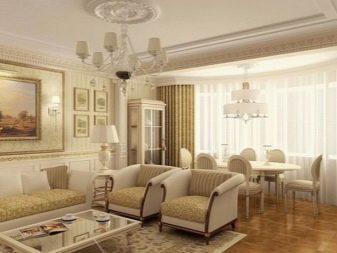
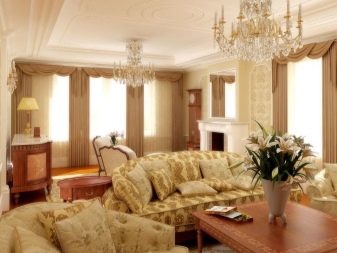
The inclusion of metal in the decor of floor lamps and table lamps is considered an original addition to the style. Powdery tones diluted with gray are added to the color scheme. Curtains can be multi-level, combining several tones of the same range, while they must be complemented with white or beige tulle.
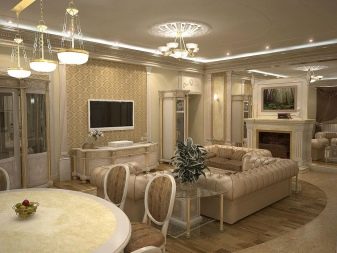
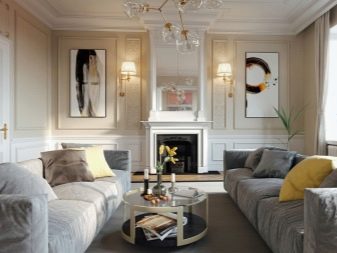
An abundance of technology is unacceptable: the plasma screen can be large, but the video system should not take up much space. Computer equipment cannot be installed in the living room. If there is not enough space, and there is nowhere else to put the computer, it is worth preparing a retractable structure for it: it should not be seen, this does not fit into the style of the classical design direction.
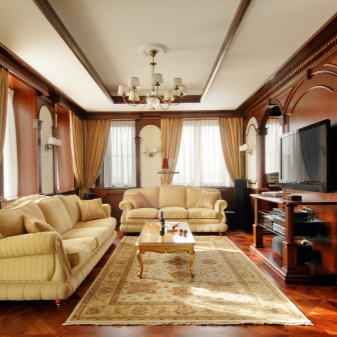
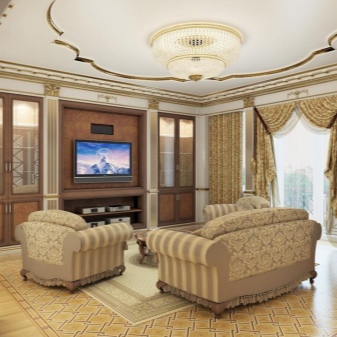
The classic style in the interior of the living room today allows for various fashionable techniques for decorating the space. If functionality is chosen as the basis, furniture items can be strictly functional, no frills, made in a restrained color scheme. By choosing bright contrasts with gilding, a premium interior is created. The living room looks great with an audio and video system, luxurious paintings in gilded frames, a fireplace, a combination of antique and modern lighting fixtures.
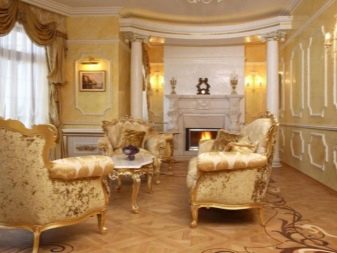
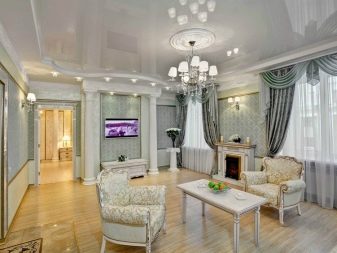
A good design technique will be the placement of a display cabinet with a stained-glass insert, a secretaire, banquets and couches in the hall. Popular furniture located in the guest area can be a typical set of sofa and armchairs, or include, in addition to a sofa with carved legs, a wooden table surrounded by several chairs in the same style as the sofa. Often the accent of the guest area is two linear sofas with leather upholstery and a pair of identical armchairs surrounding a massive coffee table.
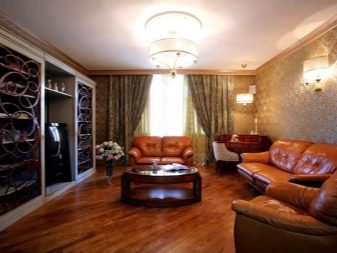
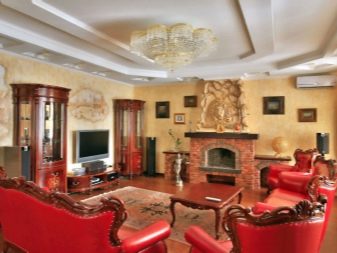
Beautiful design examples
To understand what a modern living room interior looks like in a classic style, you can refer to the examples of experienced designers:
- The design of a room with a broken perspective in a spacious apartment can be arranged in warm beige shades: the living room combined with the kitchen area looks fashionable, stylish and expensive (the neoclassical interior successfully combines prints of pillows, upholstery and flooring colors);
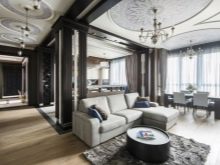
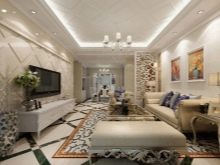
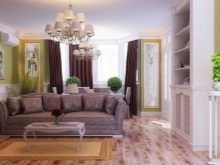
- Increase the space of the room 19-20 sq. m can be done through wide doorways, equipping the interior of the hall in sand-lilac tones, making plaster stucco on the ceiling, decorating the walls and ceiling with gilding, choosing furniture with a similar finish, adding massive curtains and carpet with an ornament to the decor;
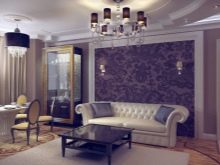
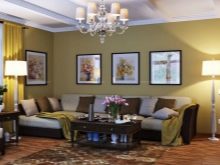
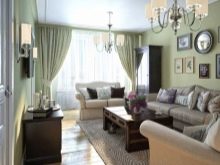
- A stylish option for decorating a space provides for a minimal set of furniture, accentuating the walls of the space by means of beige wallpaper combined with light panels, while it is better to decorate the walls with sconces with candlesticks or floor lamps.
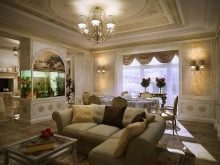
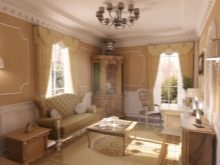
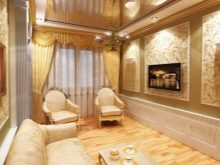
For information on how to apply modern classics in the interior, see the next video.













The comment was sent successfully.